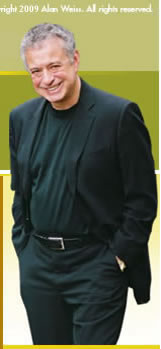    
Balancing Act: The Newsletter (No. 120: August 2009) Special Note: I�m offering a teleconference on Sales Talk, 10 role plays on 10 critical sales steps, on September 21, with a discount down to $50 for people who register before August 15. Click here to read more and register. Follow me on Twitter! You can find me here: New consulting and leadership tips posted daily! And find me on Facebook: 
The Ten -Year Anniversary of Balancing Act I looked up when I was saving this work, and realized it was issue #120—the completion of ten years of the newsletter. How can that be? I started Balancing Act with 40 names of people whom I assume wouldn't kill me if I sent them a newsletter (I was right). It's grown from there to about 8400 at the moment, with another few thousand "pass through" readers and I don't know how many journalists. That's not dramatic growth, but it's pretty decent for one of my hobbies! Since 1999, in no special order:
I can honestly look back over the decade of writing this with both nostalgia and an appreciation of where I am today. I don't want to go back, I just want to keep moving forward. But all things come to an end. And so we bid goodbye to Balancing Act in its first decade. Here's to the next decade of Balancing Act! Stay with me! 
Neither half-filled nor half-empty is very good. Someone said to me the other day that the problem with the stock market going up is that it may mean inflation is here and the supply of money is out of whack. Yes, and my getting business from a new customer may mean that the customer could have used me two years ago but waited until now. I'm still delighted to get the business! Some people have a habit of looking at good fortune and happy events as merely an uptick in their personal cycle of doom, a temporary trip to the surface for a gulp of air before they once again are weighted down in the shipwreck below. The susurrus of trouble is their constant, whispering companion. I watched a woman weep once as she moaned that she didn't know what to do with her lottery winnings since she didn't deserve to win, and she would have to agonize about how to share the money with various family members, and that no one would ultimately be happy. (She later realized she had read the ticket incorrectly, and hadn't won $2 million after all, so I guess she could cheer up.) If you only wallow in the troughs, valleys, and declivities of the roller coaster of life, and you don't rejoice in the view from the peaks and apexes, then you don't really need to be on the roller coaster. You can simply spend life in a trench. If every turn represents potential trouble, every new person is a threat, and each new request is a burden, then you're not really going to enliven many parties. You can step outside and ask what goodies life has in store for you today, or you can hide under the covers and hope nothing happens. I love it when clients of mine have asked their legal departments for advice on non-legal matters, because lawyers are trained to be arch-conservatives. If you change nothing, then little bad can happen. If you do nothing, then the chances are no one will take offense. Well, maybe you shouldn't even open the doors or put the lights on, but I'd really prefer to meet customers. The threat of being sued is, to me, minor compared to the threat of being ignored. I'm reminded of the famous definition of Puritanism: The dread fear that someone, somewhere, is enjoying himself. Enjoy life, take big gulps, trust that opportunity is to be seized. The person extending their hand may well be trying to do you a favor and is not attempting to steal your wallet. 
Complexity Okay, I'm no rocket scientist, but then again it was the rocket scientists who crashed a kibillion dollar lander on Mars because the people in Pasadena used centimeters and the people in Houston used inches, and never told each other. (I am NOT making that up.) Still, I believe in simplicity. If you want to paint the garage, I believe you hire someone to do it. But that's me. If you wanted to paint the garage, I'd advise you to prepare the surfaces, choose a color, and paint it. I would not suggest you study the history of painting structures, find a spectrograph to ascertain proper paint textures and light reflection, investigate painting permits with the town, or buy a new garage door. But that's where a lot of people start. Consultants tell me, "Well, first we'll have to do a needs analysis." People I mentor tell me, "We'll have to begin with some background information." The tree guy whom I want to shape a couple of trees says, "These white pines have an interesting arboreal history." Why must we make things so complex when the perpetrators of the complex are making things so simple? Really—cable TV, cell phones, lap tops—most are intuitive and no one ever even needs the instruction manual (which doesn't exist anyway). Yet I drove my daughter's BMW the other day, and the computer seemed to demand that I go through the history of bites and prams just to get its attention. I couldn't even find how to recirculate the interior air, which has a handy, obvious, simple button on my cars. I have a new "universal remote" that is so complex to set up that it's simpler merely trying not to lose the five separate ones that now share our bedroom. I find it hysterical that Naisbitt's accurate prediction of "high tech/high touch" is being feebly met today by people trying to use high tech to achieve high touch on places like Facebook. (Please don't send me letters, I just have Koufax rip them up.) Life can be complex and events are certainly convoluted at times. But we don't need to add to that, as if only the complex is important or accurate or relevant. I want a car I can drive without having to pull over and take a quiz. I want a worker to do what I ask without a lot of background and overload. And I want to paint the barn before the cows come home. 
I had brought my new car in to have the radar/laser detectors installed, and realized when I got home that I had left my Filofax in the back seat. I called the shop and asked them to look for it and hold on to it, and that I'd be by to pick it up. I can't get through the day without it (in fact, I had an interview scheduled which I would have forgotten about). I was going to head out to the post office in an hour, and I thought I'd better make a note to ensure I also stopped at the shop to pick up my Filofax. So I turned to the pen next to my phone on the credenza, and made a note to "pick up Filofax"—in my Filofax, which was sitting there where I had left it the night prior. It took me a minute to realize what I had just done. "We didn't find your calendar," said the guy at the shop when I picked up my car. "Yes, well, I must have left it somewhere else," I mumbled." 
|

Balancing Act® is our registered trademark. You are encouraged to share the contents with others with appropriate attribution. Please use the ® whenever the phrase "Balancing Act" is used in connection with this newsletter or our workshops. Speaking with AlanAt Alan's home
|
| Having problems viewing this email, click
here. |
|
P.O. Box 1009 � East Greenwich, RI 02818-0964 � Telephone: (401) 884-2778 � Fax: (401) 884-5068
All Rights Reserved. Copyright 2009 Summit Consulting Group








